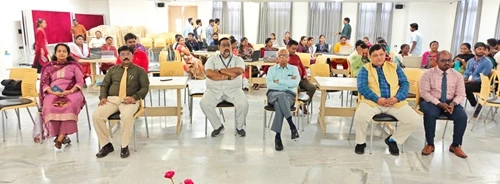From Manuscript to Impact: TAU’s FDP Inspires the New Path of Research Writing

The Apollo University, Division of Allied Health Sciences and the School of Health Sciences, in association with the Directorate of Research, TAU successfully organized a Faculty Development Programme (FDP) titled “Write It Right – Road Map for Academic Writing” on 10th October 2025. Held at the Dr. Prathap C. Reddy Knowledge Centre Auditorium, the full-day event aimed to enhance academic writing and research competencies among faculty members and research scholars from AIMSR and TAU. The initiative was part of the directorates and the dicisions broader commitment to enlighten its scholars, faculties and students with excellence and impactful research.
The programme was inaugurated by Vice-Chancellor Dr. H. Vinod Bhat, who emphasized that quality research is the lifeline of any university’s reputation and The Apollo Knowledge City Campus in its budding stage itself has done wonders in terms of research output. He introduced the institution’s new research policy and encouraged faculty to pursue research that is both socially relevant and ethically grounded. The inaugural session was graced by invited guests including Dr. Ramesh S. V., Ve, CEO and Founder, NeuraSim Pvt. Ltd., and Visiting Professor, School of Health Sciences, TAU and Dr. Gopinath Madeswaran, Founder and Lead Consultant, Opto Research Consultancy Services & Opto Research Academy, Dr. Usha Adiga, Director of Research, TAU and Associate Dean (Research) AIMSR, and Prof. K. Bhaskar Reddy, Dean of SOHS & AIPS, who restated the importance of structured academic writing in elevating institutional visibility, research grant approvals and credibility.
The first technical session, Effective Literature Review, was conducted from 9:40 AM to 11:00 AM. This hands-on and interactive session explored traditional and AI-based approaches to literature review. Participants were guided through the differences between Google, Google Scholar, and PubMed, and learned how to refine search strategies using keywords and Boolean operators. The session also introduced ethical use of AI tools in research, with live demonstrations and participant practice enhancing engagement and understanding.
Following, the second session titled Writing a Winning Research Grant Proposal was held from 11:20 AM to 12:45 PM. This lecture and group activity focused on the key components of grant writing, including aims, background, methodology, and budgeting. Participants engaged in a collaborative exercise to deconstruct a published research protocol, gaining insights into crafting compelling and fundable proposals.
After the lunch break, the third session, Write It Right: Road Map for Publishing in Academia, ran from 1:45 PM to 4:00 PM. This session covered the IMRAD structure (Introduction, Methods, Results, and Discussion), principles of effective academic writing, journal selection strategies, submission protocols, and peer review processes. Ethical publishing practices were emphasized, and participants worked in groups to develop outlines and draft introductory sections of academic manuscripts.
The final segment, Reflections & Future Horizons, provided an open forum for participants to share key takeaways, ask questions, and discuss future directions in academic writing. The session concluded with remarks from the organizing committee, expressing gratitude to the resource persons—Dr. Ramesh S. V. and Dr. Gopinath Madeswaran—for their insightful contributions and to all attendees for their enthusiastic participation.
Overall, the FDP was a success, equipping faculty and scholars with practical tools and strategies to elevate their academic writing and research output. The collective efforts of the Directorate of Research and the AHS Division led by Dr. Sucharitha P as HoD made the event fruitful and successful.
